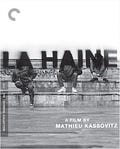La Haine Analysis *spoiler warning* by Ezra S.
La Haine, or Hatred, is a 1995 French film starring Vincent Cassel, Hubert Kounde, and Said Taghmaoui. It surrounds their lives as young men, part of a restless generation, at a time of social unrest in the banlieues of Paris. If you haven't watched it, I highly recommend you do. You can find it on Youtube in HQ with subtitles in a number of languages, including English.
If not, at least read a plot summary so my analysis makes sense. Kassovitz, the director, was inspired by a number of events that took place in France around the time of the films creation. For example, the killing of a young man named Makome M'Bowole, a Zairian (modern day Democratic Republic of Congo), who was shot in the head point blank by an officer who was threatening him with his gun. It was a pointless death, an accident, and free of hatred. But this sort of needless violence is what sows hatred, and it creates a cycle of violence in a failing society. Another case was that of Malik Oussekine, an Algerian student who was beaten to death by the police during a set of student protests that he was not a part of. The laws being protested were scrapped two days later. Clearly, police brutality is a major theme in the film, as well as race and class.
All three main characters are minorities. Vinz is a Jew, Said is an Arab, and Hubert is black. What unites them is their working class background in a deprived, crime ridden area of Paris. Hubert owned a gym which was burned down in the protests, and he returns to selling drugs to support his mother and sister. While Vinz and Said's family lives aren't discussed much, both of them are in similar positions to Hubert. Few opportunities, few role models, and a lot of rage. This rage presents itself most clearly in Vinz, who spends the whole film on the verge of murder. However, when he finally gets the chance to kill someone, his gun pointed against the forehead of a man who many would prefer to be dead, he can't bring himself to pull the trigger. He even retches after letting him go. Hubert, who was encouraging Vinz to kill the man he had beaten, knew that it wasn't in him. Despite his gangster persona, Vinz is not hateful enough to murder another. He impersonates Travis Bickle from Taxi Driver in the mirror, and aspires to be a dancer. He is not a murderer.
And then, he is killed. For no reason at all, an officer accidentally shoots him in the head. The events of the whole film are rendered meaningless, in a way. The character evolution of Vinz was pointless. The skinhead nazi he held at gunpoint likely didn't change, and a life was lost in the end regardless; his own. Said, who didn't want to see the darkness of pointless killing, is forced to watch Vinz die, and forced to watch Hubert, who spent the whole film trying to convince Vinz that murder was pointless, the one who catalyzed the change in him, takes revenge into his own hands. earlier in the film, Hubert tells Vinz that 'La haine attire la haine.' Hatred breeds hatred. Now, even though the death of Vinz contained no hatred from the officer, Hubert is continuing the cycle of violence. Vinz's hatred for the police was justified in his death, and Hubert continues it, betraying his ideals, while Said can do nothing but watch.
As the movie ends, the opening lines are repeated. In these lines, the plot of the film can be found entirely, as well as the theme it presents, or more accurately, the reality it portrays.
'It's about a society on its way down. And as it falls, it keeps telling itself: "So far so good... So far so good... So far so good." It's not how you fall that matters. It's how you land.'



